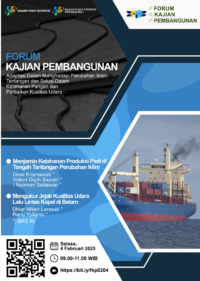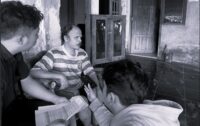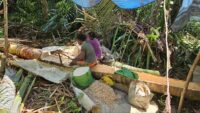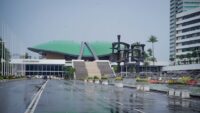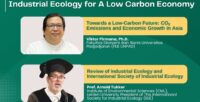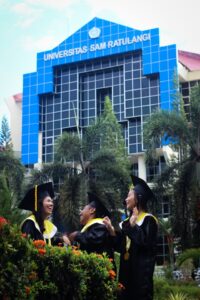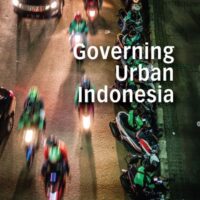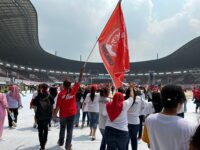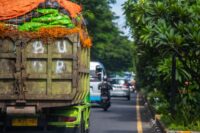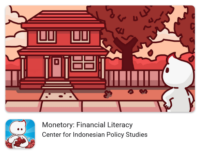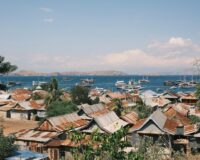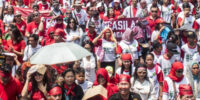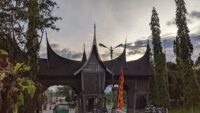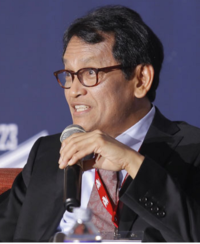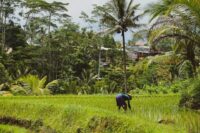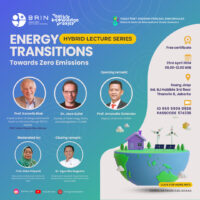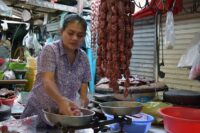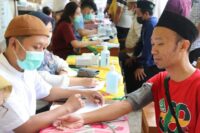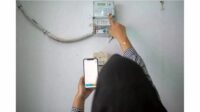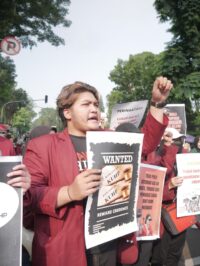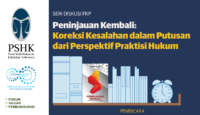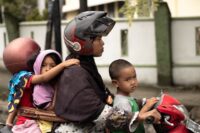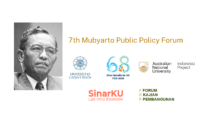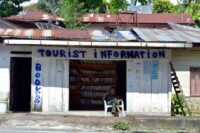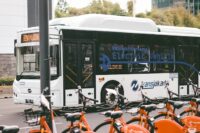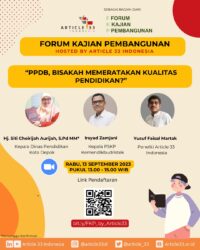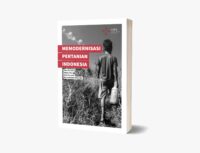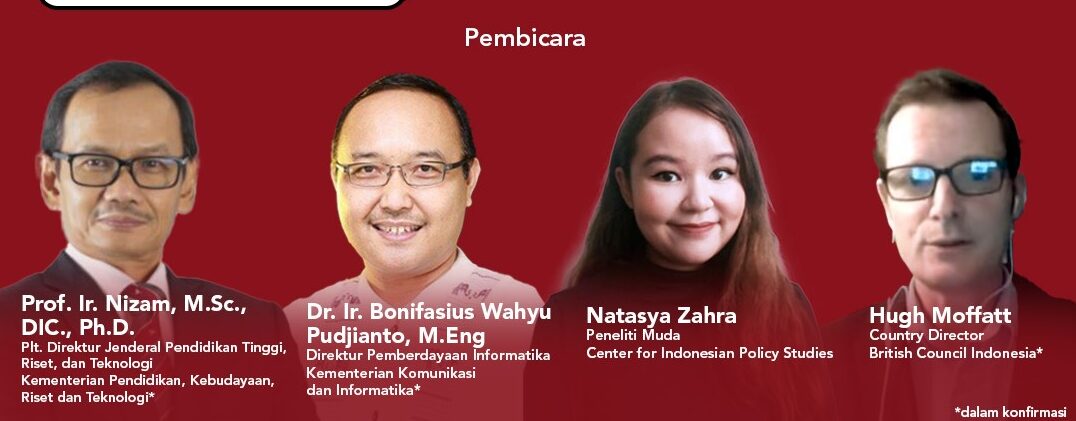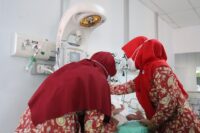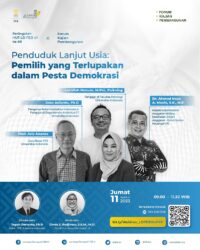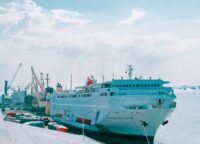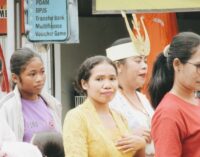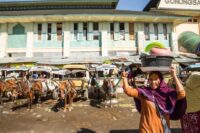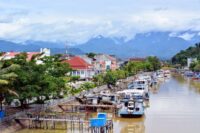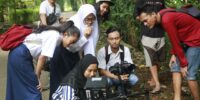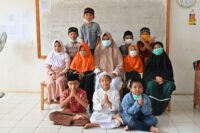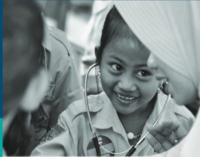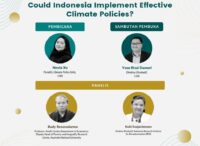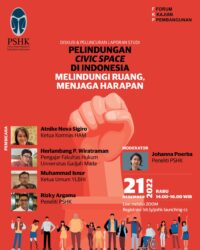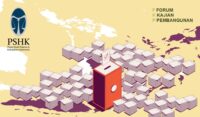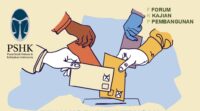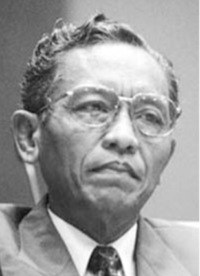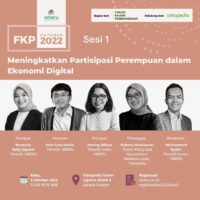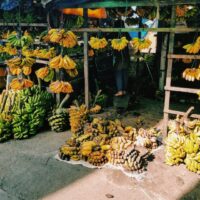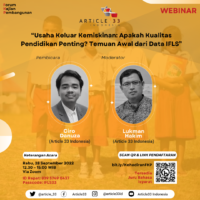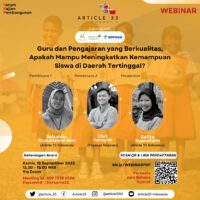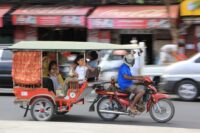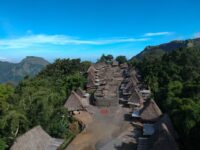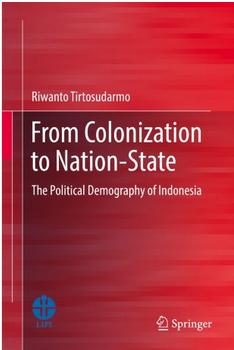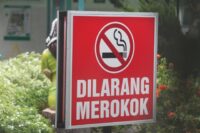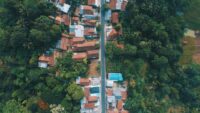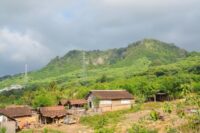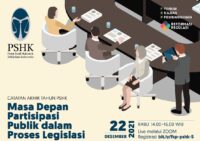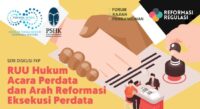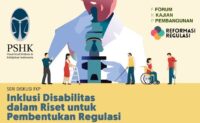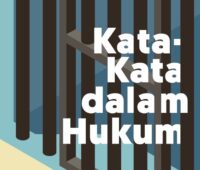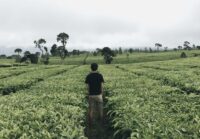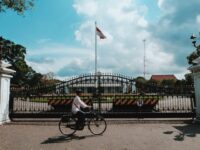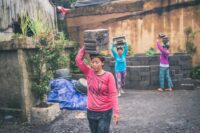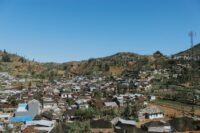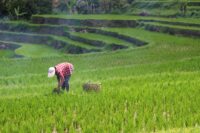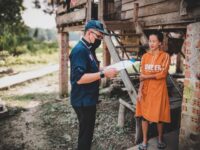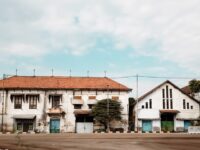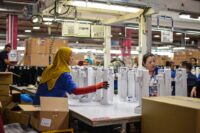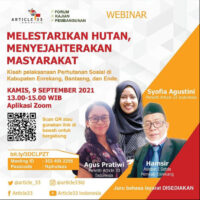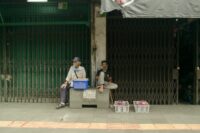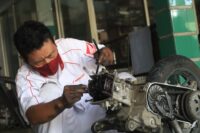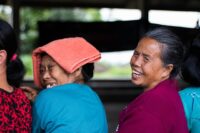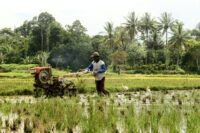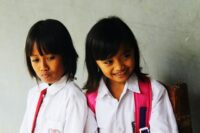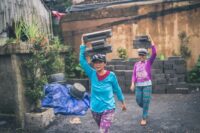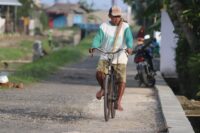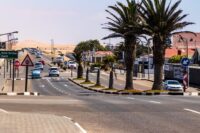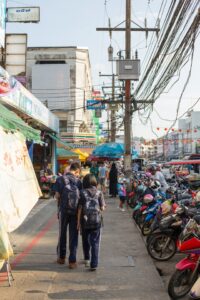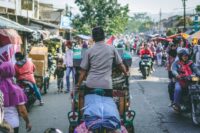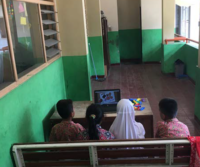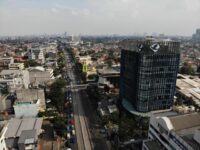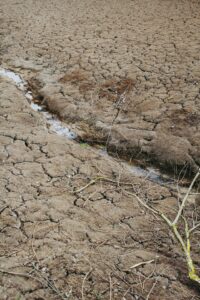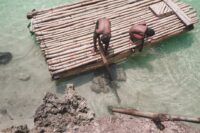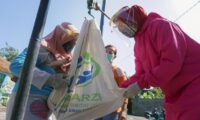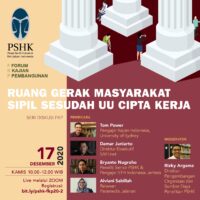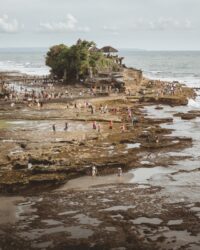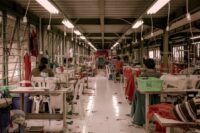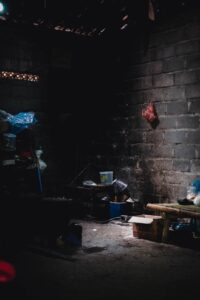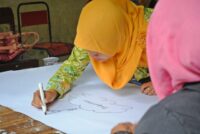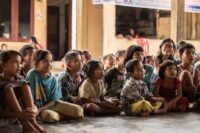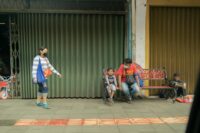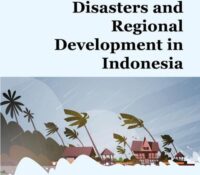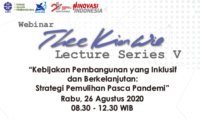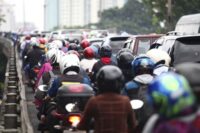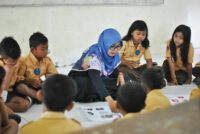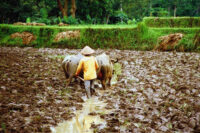Tuesday, 18 March 2025. Business-politics relations in Indonesia: the oligarchization of democracy
Seminar ini akan berlangsung secara hybrid dengan tuan rumah Pusat Studi Hukum dan Kebijakan (PSHK) dan ANU Indonesia Project. Presentasi didasarkan atas artikel yang akan terbit di Bulletin of Indonesia [...]
Tuesday, 25 March 2025. Health and extractive resources: a research note based on evidence from Indonesian districts
Seminar ini akan berlangsung secara daring dengan tuan rumah ANU Indonesia Project. Presentasi didasarkan atas artikel yang terbit di Bulletin of Indonesia Economic Studies (BIES). Tautan ke artikel (open access): [...]
Announcements for past webinars
Past seminars
FKP webinars in May hosted by Institute for Economic and Social Research, Faculty of Economics and Business, Universitas Indonesia (LPEM FEB UI) with events on 12, 13, 14, 19 and 20 May 2020
The webinars will use Zoom application, which can be downloaded from for PC, MAC, android, etc. Most events will require registration. The virtual seminar room will be open 10 minutes before the start of the webinar. Please mute your microphone upon entering the virtual seminar room, and use the ‘Raise your hand’ function if you would like to pose a question during Q&A.
Tuesday, 12 May 2020, 10.00 – 11.00 WIB
The impact of COVID-19 pandemic on the tourism sector in Indonesia
M. Dian Revindo (LPEM FEB UI)
This study aims to estimate the impact of the COVID-19 pandemic on the tourism-related sectors in Indonesia, namely provision of accommodation, food and beverages, transportation, retail, and other services. The effect takes place through the drop in domestic and international tourist visits amid the physical distancing policy. Two scenarios of pandemic are considered: infection curve flattens by 1) early July or 2) by early September. In both scenarios, the tourism-related sectors will hit negative growth. The policy responses in the short term (during the pandemic) and during the recovery period are proposed and discussed.
Registration required, via FKP 12 Mei 2020
—
Wednesday, 13 May 2020, 14.00 – 16.00 WIB
Pandemi COVID-19 dan Kebijakan Perpajakan Indonesia: Tinjauan Tax Policy and Research
This event is free for students but a fee is applied for the public. Please
Speakers: Febrio Kacaribu (Badan Kebijakan Fiskal, Kementerian Keuangan), Hestu Yoga Saksama (Direktorat Jenderal Pajak, Kementerian Keuangan), Vid Adrison (Departement Ilmu Ekonomi, Universitas Indonesia) and Yulianti Abbas (Pasca Sarjana Ilmu Akuntansi, Universitas Indonesia)
Registration link https://bit.ly/webinarterc2020
—
Thursday, 14 Mei 2020, 10.00 – 11.00 WIB
The impact of tourism on poverty alleviation and income distribution: evidence from Indonesia
Riyanto Umar (LPEM FEB UI) dan Djoni Hartono (Departement Ilmu Ekonomi, FEB UI), M. Dian Revindo (LPEM FEB UI) and Natanael W.G. Massie (LPEM FEB UI)
Tourism has important contribution towards Indonesia’s economy and the role tends to increase through time. This study aims to delve deeper into the impact of tourism on poverty and income distribution. The study employs Miyazawa’s input-output, econometrics, and micro simulation models. The results of the simulation show that without tourism activity, Indonesia’s poverty rate in 2014, 2015, and 2016 is expected to be 4% higher than the actuality. The study will also discuss how tourism contributes to reducing the depth and severity of poverty, and how regions with tourism as a main economic activity a lower poverty rate than those without. Further, domestic tourism activity offers a bigger contribution towards the lower income group when compared to their international counterparts. The implication of the study findings for policy-making and tourism businesses is discussed.
Registration required, via FKP 14 Mei 2020
—
Tuesday, 19 May2020, 10.00 – 11.00 WIB
Assessment of fisheries tax to promote sustainable fisheries management in Indonesia
Alin Halimatussadiah (Departemen Ilmu Ekonomi FEB UI)
If designed properly, fiscal instruments can be powerful to change behavior towards a more sustainable resource extraction path. Facing risk in fishery exploitation, imposing the right tax scheme will not only reduce unsustainable practice but also increase government revenue. In 2018, the fisheries sector contributed 2.29 percent to Indonesia GDP while the sector only generated 0.22 percent of the total non-tax state revenue, which can be considered low compared to other extractive sector such as forestry and coal. Currently, fishery-related taxes are only imposed to large vessels (>30GT). This study aims to examine the current fishery-related tax and develop simulations on two kinds of tax: license tax and production tax. We develop a model that accommodates the behavior of both large and small vessels on the fishing effort. We compare the impact of several tax scenarios to several outcome variables, namely share of harvest of small vessels, distribution of fishery profits, tax revenue generated, and fish biomass.
Registration required, via FKP 19 Mei 2020
—
Wednesday, 20 Mei 2020, 10.00 – 11.00 WIB
Political competition and economic performance: evidence from Indonesia
Jahen F. Rezki (Departemen Ilmu Ekonomi FEB UI)
This paper analyses the impact of political competition on district government performance in Indonesia using a new database that covers 427 districts in Indonesia from 2000 to 2013. Political competition is measured using the Herfindahl Hirschman Concentration Index for the district parliament election. This variable is potentially endogenous, because political competition is likely to be non-random and correlated with unobservable variables. To solve this problem, the study uses the lag of the average political competition within the same province and the political competition from the 1955 general election, as instrumental variables for political competition. The degree of political competition has been found to boost real Regional Gross Domestic Product (RGDP) per capita and RGDP growth by 3.24% and 1.11%, respectively. This study also finds that stiffer political competition is associated with higher public spending (e.g. infrastructure spending) and pro-business policies.
Registration required, via FKP 20 Mei 2020
FKP webinars in April hosted by Center for Economic Research (P2E) LIPI with events on 1, 8, 14, 16, 17, 21, 24 and 30 April 2020
The webinars will use Zoom application, which can be downloaded from for PC, MAC, android, etc. {Prior registration is not needed, but participation is on a first come, first served basis. But please update your name and institution upon entering the webinar. The virtual seminar room will be open 10 minutes before the start of the webinar. Please mute your microphone upon entering the virtual seminar room, and use the ‘Raise your hand’ function if you would like to pose a question during Q&A.
Wednesday, 1 April 2020, 09.00 – 11.00 WIB
Hosted by ANU Indonesia Project
Global Web Seminar. Reading the Corona: from gloom to doom, are we doing the right thing?
Haryo Aswicahyono (Centre for Strategic and International Studies), Puspa Amri (Sonoma State University), Erick Hansnata (KPMG Australia), Ari Perdana (Asian Development Bank)
In the first Indonesia Project Global Seminar last week, policy challenges in dealing with the coronavirus outbreak in Indonesia was discussed. In this second talk, some comparative perspectives on what measures have been introduced in other countries and how they might or might not work in Indonesia will be discussed. Erick Hansnata from KPMG Australia will discuss the relevant measures in Australia, Ari Perdana from the Asian Development Bank will talk about President Duterte’s policy in the Philippines, and Puspa Amri from Sonoma State University will talk about public health responses from various states and counties in the United States – and the gigantic disaster relief recently rolled out by the US government. Finally, Haryo Aswicahyono from the Centre for Strategic and International Studies will update us on the situation in Indonesia and explore which lessons from other countries that may fit with Indonesia.
Webinar link https://anu.zoom.us/j/735937379
—
Wednesday, 8 April 2020, 10.00 – 11.30 WIB
Hosted by ANU Indonesia Project
Restricting human movements: public health outcomes and economic consequences
Pandu Riono (Universitas Indonesia), Manoj Pandey (ANU/University of Papua New Guinea), I Nyoman Sutarsa (ANU)
In an attempt to contain the spread of the SARS-Cov-2 virus, social distancing has been the norm. With the COVID-19 pandemic fastly crawling to every corner, social distancing needs to morph into stricter forms: self-isolation, house quarantine, territorial quarantine, and even lockdown. But enforcement, as it turns out, proves very complicated. The stampede in India is a case in point. As the health crisis turns into an economic crisis, most of the poor can not even afford to comply with distancing policies. In this webinar, the third in our series covering the COVID-19 pandemic, we invite epidemiologist Pandu Riono from Universitas Indonesia to talk about the social distancing intervention controversy in Indonesia. Next, we will listen to economist Manoj Pandey from ANU/UPNN about the pros and cons of lockdown policy in India. Finally, health and medicine scholar I Nyoman Sutarsa from ANU College of Health and Medicine will discuss the implication of restriction policies to the poor and possible ways to balance the tension between public health risk and economic risk.
Webinar link https://anu.zoom.us/j/592509031 Webinar ID: 592-509-031
—
Tuesday, 14 April 2020, 10.00 – 11.00 WIB
Village transformation toward a new world icon: tourism and digital village
Arvin I. Miracelova (Baliwood Land Development)
Villages in Indonesia have the creative potential to become “world community” villages through the exposure of their nature, people, culture and local traditions to a global audience. Baliwood Land, developed in 2018, explores thematic film village tourism (an eco-friendly film adventure park) and creative screen content industry (platform films) based on local village nature and culture combined with digital innovation, a creative community, and global connections. The initiative is still in its infancy yet there is a promising future for a global brand and world icon status. More information about Baliwood Land can be found through its website www.baliwoodland.com
Webinar link https://anu.zoom.us/j/385988213 (meeting ID 385-988-213)
—
Thursday, 16 April 2020, 10.00 – 11.00 WIB
Energy Poverty under the Jokowi Presidency: Performance, Policies and Challenges
Maxensius Sambodo (Center for Economic Research, LIPI)
This presentation aims to investigate the state of energy poverty in Indonesia. This paper has three objectives: (i) to evaluating the condition of energy poverty in Indonesia during the Joko Widodo Presidency; (ii) to investigate existing energy policies that affect energy poverty alleviation; (iii) and to propose further actions. We focused on two dimensions of energy poverty such as electricity access and clean energy for cooking. In terms of definition of energy poverty, Indonesia does not have a consensus on the standard of electricity access. The electrification ratio that is planned to reach 100% this year, may not reflect the true condition. Similarly, a high number on rural electrification ratio, does not a means equal electricity access. Although clean energy for cooking has improved significantly since 2007, Indonesia has been trapped into energy subsidy for 3 Kg LPG. This may reduce resources to alleviate ‘double energy poor’. Although, problem on clean energy for cooking is more severe that electricity access, the percentage of villages without access on electricity have lower index of development and index of rural geographic difficulty. Thus, implies that providing infrastructure for improving electricity access will have better outcome on the rural development index. We proposed that government needs to re-thinking energy subsidy policy and more focus in alleviating the dual energy poor family.
Webinar link https://anu.zoom.us/j/94294028766 (meeting ID 942-9402-8766)
Friday, 17 April 2020, 10.00 – 11.30 WIB
Corona-induced tension between regulations and actions
Hosted by ANU Indonesia Project
Philips J Vermonte (Centre for Strategic and International Studies), Bivitri Susanti (Pusat Studi Hukum dan Kebijakan Indonesia), Imelda Deinla (ANU)
Regulations are generally rigid and complex. At times, however, policymakers are faced with a situation where they have to make very quick decisions and follow with rapid actions. The corona crisis has brought this tension up again. In this webinar, we invite Philips Vermonte (CSIS), Bivitri Susanti (PSHK) and Imelda Deinla (ANU) to discuss how governance and regulations interact in this extraordinary time. Vermonte will look at this issue from the global perspective, while Susanti and Deinla will discuss cases from Indonesia and the Philippines, respectively.
Webinar link https://anu.zoom.us/j/98882449339 (Meeting ID 988-8244-9339)
—
Tuesday, 21 April 2020, 10.00-11.00 WIB
Effect of Growing up Poor on Labor Market Outcomes: Evidence from Indonesia
Asep Suryahadi (The SMERU Research Institute)
Webinar link to be announced
—
Friday, 24 April 2020, 10.00 – 11.30 WIB
Role of agricultural insurance for small-scale farmer protection and agriculture sustainability
Ali Yansyah Abdurrahim (Center for Population Research, LIPI)
Registration link (required)
Efforts to protect farmers in the form of risk sharing through agricultural insurance programs are needed because farmers face a high risk of crop failure, even though most farmers are small farmers with limited abilities. Uncertainty in farming has been increasing lately due to disasters and attacks by plant pests, mainly influenced by the effects of climate change. The government, based on Law No. 19 of 2013, developed “the Rice Farmers Business Insurance Program” (AUTP) which began in 2012. This presentation aims to understand the AUTP problem and provide solutions to strengthen the program.
—
Thursday, 30 April 2020, 10.00 – 11.30 WIB
Basic income, climate and nature: a review
Ni Made Rahayu Maitri (Research Center for Climate Change, Universitas Indonesia/RCCC UI), Fatiya Rumi Humaiara (RCCC UI) dan Sonny Mumbunan (RCCC UI dan World Resources Institute (WRI) Indonesia)
Registration link (required)
This paper presents a review of basic income in the context of climate and nature. In the literature, the review of this emerging thematic area of basic income constitutes the first of its kind. It begins by tracing the history of so-called ecological basic income and then proceeds with theoretical and practical cases of basic income broadly associated with climate change and nature conservation. This paper further discusses these cases and structures the discussion around four points of interest: (1) conditionality characteristic that seemingly contradictory defines basic income in contexts of climate and nature, and proposed perspective to surpass this contradiction through what is characterized as a jurisdictionally unconditioned yet implicitly context-conditioned basic income; (2) dilemma of funding for basic income through sources from ‘’climate and nature’’ that are carbon-intensive or ecosystem-degrading such as from rents from fossil fuels or land-based extraction posing an impending risk to both ecological sustainability and financial sustainability of basic income scheme; (3) income turning point and environmental degradation; and finally (4) basic income in decoupling emissions from economic growth within a productivist society and its transition toward a low-carbon society. The paper provides concluding remarks and illustrative example of basic income scheme that entails non-contradictory elements.
—
FKP meetings in March are replaced with web seminars on 19 and 26 March
March 2020 hosted by WRI Indonesia and SDGs Center Universitas Hasanuddin with seminars on Thursday, 5 March, Thursday, 19 March and Thursday 26 March
Thursday, 5 March 2020, 10.00 – 11.30 WIB
This seminar is hosted by ANU Indonesia Project
Gedung Ali Wardhana Lantai 7, LPEM FEB UI, Jl Salemba Raya No 4, Jakarta
Indonesia and the international community – 50 years of economic cooperation
Peter McCawley AM (ANU Indonesia Project)
During the past 50 years, there has been a strong program of economic cooperation between Indonesia and the international community. On one hand, Indonesian leaders and policy makers have always emphasised the goals of ensuring independence and protecting sovereignty in international relations, including in the field of economic cooperation. On the other hand, the program of collaboration between Indonesia and the international community since the late 1960s has been a quite remarkable endeavour. The program has been one of the largest sustained development cooperation programs in post-war history.
One of the keys to sustained cooperation was a will on both sides to work well together. On the Indonesian side, senior leaders such as Widjojo Nitisastro and Ali Wardhana worked effectively with the international community. On the development partner side, there was a well-judged and long-term relationship with Indonesia’s leaders. A second element in the partnership was Indonesia’s strong ownership of the development cooperation program. A third key was the flexibility of the international program – as the situation changed in Indonesia, so international partners changed the way they worked in Indonesia.
Large scale programs of international cooperation do not always succeed. This presentation draws on the experience of the Asian Development Bank’s work in Indonesia to consider lessons from the 50 years cooperation from which the current Indonesian government and the global development community have much to learn.
Registration: fkp20200305.eventbrite.com
—
Thursday, 19 March 2020, 14.00 – 15.30 WIB
System of Environmental Economic Accounting (SEEA)
1) Prospects for establishing an asset account for non-timber forest resources in Indonesia
Rida Nurafiati (WRI Indonesia)
This seminar will discuss the challenges and prospects for the application of SEEA (System of Environmental Economics Accounting) to account for non-timber forest resources in Indonesia, with emphasis on the current state of the measurement scopes and physical valuations methodology applied by four government institutions (i.e., Statistics Indonesia, the Ministry of Agriculture, the Ministry of Trade, and Perum Perhutani). The seminar will also discuss solutions to address various challenges including using a singular definition across institutions, implementing standardized conversion factors, and establishing a clear measurement scope for products (e.g., excluding derivative products).
2) Application of SEEA in Marine Resources: A Case of Mangrove
Rizky Firmansyah (WRI Indonesia)
Registration bit.ly/webinar-fkp-190320
Once registered, you will receive an email with a unique link to access the web seminar (webinar). The webinar will be conducted using the Zoom online meeting platform (you can download the program/application for PC, MAC, android, etc).
—
Thursday, 26 March 2020, 14.00 – 15.30 WIB
1) Finance for sustainable ocean economy
Zuzy Anna (Fakultas Perikanan dan Ilmu Kelautan, Universitas Pajajaran)
2) Local coastal management
André Aquino (The World Bank)
Registration bit.ly/webinar-fkp-260320
Once registered, you will receive an email with a unique link to access the web seminar (webinar). The webinar will be conducted using the Zoom online meeting platform (you can download the program/application for PC, MAC, android, etc).
—
February 2020 with FKP Roadshow 3-6 February and seminars in Jakarta hosted by Bank Indonesia Institute on Tuesday, 11 February and Tuesday, 18 February
2020 FKP Roadshow on the theme of education
3 February: Faculty of Economics and Business, Universitas Lambung Mangkurat, Banjarmasin
4 February: Faculty of Economics and Business, Universitas Palangka Raya, Palangka Raya
5 February: Faculty of Economics and Business, Universitas Mulawarman, Samarinda
6 February: Faculty of Economics and Business, Universitas Tanjungpura, Pontianak
Speakers:
Budy Resosudarmo (Indonesia Project, The Australian National University), all cities
Daniel Suryadharma (The SMERU Research Institute), all cities
Tri Mulyaningsih (Universitas Sebelas Maret), all cities
Muzdalifah (Universitas Lambung Mangkurat) in Banjarmasin
Andrie Elia (Universitas Palangka Raya) in Palangka Raya
Fitriadi (Universitas Mulawarman) in Samarinda
Fariastuti Djafar (Universitas Tanjungpura) in Pontianak
—
Tuesday, 11 February 2020, 10.00 – 12.00 WIB
Ruang Audiovisual Perpustakaan, Menara Sjafruddin Prawiranegara Lantai 2, Bank Indonesia, JL MH Thamrin No 2, Jakarta
1) Implementasi Tarif Pajak Tontonan Film yang Berdaya Saing dan Inklusif
Pihri Buhaerah (Pusat Penelitian Ekonomi LIPI)
Jumlah penonton bioskop di Indonesia terus meningkat dari 100,6 juta pada 2016, 108,2 juta pada 2017, dan 129,5 juta pada 2018. Namun jumlah layar yang tersedia belum mampu mengimbangi pertumbuhan jumlah penonton film. Salah satu penyebabnya adalah persebaran bioskop yang terpusat di Pulau Jawa dengan jumlah bioskop sebanyak 335 bioskop atau mencapai 69% total bioskop. Salah satu kendala utama penambahan jumlah layar di luar Pulau Jawa adalah masih tingginya tarif pajak tontonan di wilayah tersebut, mulai dari 10% hingga 35%. Kondisi tersebut menciptakan iklim ketidakpastian bagi pengusaha bioskop, terlebih lagi tarif pajak tontonan sewaktu-waktu bisa berubah. Karena itu sejumlah pelaku usaha meminta kepastian dan penurunan tarif pajak tontonan film ke pemerintah pusat. Namun permintaan tersebut sulit untuk dipenuhi karena pajak tontonan film merupakan kewenangan pemerintah daerah. Padahal penurunan tarif pajak tontonan merupakan salah satu instrumen untuk memacu perkembangan industri film nasional. Studi ini menganalisis dan memberi rekomendasi besaran tarif pajak tontonan film yang lebih berdaya saing dan inklusif.
2) Defining Generations based on Indonesia’s Experiences
Turro Wongkaren dan Diana Stojanovic (Lembaga Demografi Universitas Indonesia)
Milennials. Generation X. These terms are often used both in the media and in academic setting. We rarely realize, however, that the generational terms based on American experience may not be applicable to other societies. This presentation seeks to start a discussion on how we can define generations based on Indonesian experience. A quantitative analysis is used to classify birth cohorts from 1947-2003 into several generations. The implications of different classifications will also be discussed.
Registrasi https://fkp20200211.eventbrite.com.au
—
Tuesday, 18 February 2020, 10.00 – 12.00 0 WIB
Ruang Audiovisual Perpustakaan, Menara Sjafruddin Prawiranegara Lantai 2, Bank Indonesia, JL MH Thamrin No 2, Jakarta
1) On Socio-Economic Predictors of Religious Intolerance: Evidence from a Large-Scale Longitudinal Survey in the Largest Muslim Democracy
Arief Anshory Yusuf (Departemen Ilmu Ekonomi, Universitas Padjadjaran) dan Hariyadi (Departement Sosiologi, Universitas Soedirman)
Motivated by increasing religious intolerance, we study the socio-economic covariates of individual-level religious intolerance in Indonesia, the largest Muslim democracy in the world. We use panel data from 2007 and 2014 of more than 20,000 adult individuals (representing 83% of the population) and apply fixed-effect regression analysis to identify relevant socio-economic characteristics that are highly associated with religious intolerance at the individual level. We utilize survey questions on willingness to accept someone with different faith living in the same village, living in the same neighbourhood, renting a house, marrying relatives or children, and building a place of worship in the neighbourhood as our measures of religious intolerance. We find that higher individual income and educational attainment are positively correlated with the tolerance level. At the same time, a higher level of self-declared religiosity is negatively correlated with a tolerant attitude. For location-specific characteristics, higher income inequality and extent of poverty in the location where an individual resides are associated with a higher level of religious intolerance. These patterns are generally robust across different measures of religious intolerance, although there is heterogeneity in the magnitudes of the correlations, where these covariates have the smallest correlations with the willingness to accept interfaith marriage in the family.
2) Radiator Spring Phenomenon: Unintended Consequences of Toll Road Infrastructure
Martin Siyaranamual (Departemen Ilmu Ekonomi, Universitas Padjadjaran)
Registrasi https://fkp20200218.eventbrite.com.au
—
January 2020 hosted by ANU Indonesia Project with 3 seminars on 9, 23 and 29 January 2020.
Thursday, 9 January 2020, 10.00 – 11.30 WIB
Gedung Ali Wardhana Lantai 7, LPEM FEB UI, Kampus UI Salemba, Jl Salemba Raya No 4, Jakarta
Learning by exporting: the role of competition
Arianto Patunru (Indonesia Project, The Australian National University)
Abstract: This study shows that increased competition in export markets could reinforce firms’ learning-by-exporting processes. We investigate competition as a learning channel by employing 25 years’ worth of Indonesian garment firms’ data. Firms in this labour-intensive industry experienced a long period of a quota regulation under the Multi-Fibre Arrangement (MFA), which governed much of the global trade in garments before its abolition in 2005. This allows us to conduct a quasi-natural experiment type of study on how the MFA affected apparel exporters’ performance. Using propensity score matching and difference-in-difference methods, we find that the impact of exporting on total factor productivity during the MFA implementation period is mixed; but after it was abolished, productivity increased by more than 12 percent. This implies that exporters gain a significant learning-by-exporting benefit from competition (that is, without a special facility such as the MFA), and that interventions that protect exporters from such competition might lessen the benefit.
Registration https://fkp20200109.eventbrite.com.au
—
Thursday, 16 January 2020, 10.00– 12.00WIT
Ruang Rapat Dekanat, FEB Universitas Cenderawasih, Jayapura, Papua
Analisa kuantitatif dalam mengamati hubungan antara bantuan sosial, media digital dan perkembangan industri rumah tangga di Indonesia
Budy P. Resosudarmo (Indonesia Project, The Australian National University)
—
Monday, 20 January 2020, 09.30 – 11.30 WIT
Aula Pasca Sarjana, Universitas Papua, Manokwari, Papua Barat
Analisa kuantitatif dalam mengamati hubungan antara bantuan sosial, media digital dan perkembangan industri rumah tangga di Indonesia
Budy P. Resosudarmo (Indonesia Project, The Australian National University)
—
Thursday, 23 January 2020, 09.00 – 11.30 WIB
D-Lab, Jl. Riau No.1, Menteng, Jakarta Pusat
This seminar is hosted by The Abdul Latif Jameel Poverty Action Lab (J-PAL) Southeast Asia
Study on Indonesian female migrant workers
Firman Witoelar (Indonesia Project, The Australian National University) and Simone Schaner (University of Southern California)
Registration: https://fkp20200123.eventbrite.com.au
—
Wednesday, 29 January 2020, 13.00 – 14.30 WIB
Ruang Kapuas, WRI Indonesia, Wisma PMI Lantai 3, Jl Wijaya I No 63, Kebayoran Baru, Jakarta
1) Implications of East Asia energy integration on carbon emissions in the region
Budy P. Resosudarmo (Indonesia Project, The Australian National University)
Abstract: It has been argued that East Asia’s electricity market would be integrated in the next few decades. Few studies, however, are available about its social, economic, and environmental implications for the region, particularly for ASEAN countries. Would the integration lower carbon emissions from the region? Would the poor benefit from the integration? This paper utilises an Inter-regional Social Accounting Matrix for East Asia in an attempt to analyse the implications of the East Asia’s electricity market integration on the socio-economic and environmental performances of the region, particular for ASEAN countries.
2) What does it take to achieve South East Asia energy transition?
Almo Pradana (Energy and Climate Senior Manager, WRI Indonesia)
Southeast Asia (SEA) energy demand is projected to double by 2040, representing 12% rise in projected global energy use in 2040 (IEA, 2019). Policy makers across SEA countries have increased efforts in providing more sustainable and/or low carbon energy generation and facilities, especially in providing universal access to rural communities. The involvement of large-scale energy consumers, the private sector, plays a major role in accelerating energy transition and achieve countries’ climate targets. The presentation will discuss current state of the art role of private sector in addressing provision of low-carbon energy, including policy and business opportunities and challenges for the sector.
Registration: https://fkp20200129.eventbrite.com
—
December 2019 hosted by Pusat Studi Hukum dan Kebijakan (PSHK) dan INSPIRASI Foundation with 5 seminars on 4, 5, 10, 17 and 29 December 2019.
Wednesday, 4 December 2019, 14.00 – 15.30 WIB
PSHK, Puri Imperium Office Plaza UG 11-12, Jl. Kuningan Madya Kav 5-6, Jakarta
Territorial autonomy in Indonesia and beyond
Shane Barter (Soka University of the Americas)
Abstract: Territorial Autonomy, in which regionally concentrated minorities gain the ability to govern their territory with special administrative powers, is an increasingly important political compromise around the world. It is increasingly the go-to option for overcoming separatist conflicts and protecting minority rights, enabling national minorities to see themselves as majorities and to develop their national identity. However, when it is imposed and conflicts have not been resolved, autonomy can serve to worsen conflicts. Even when autonomy is in the hands of more legitimate leaders, it still suffers from some shortcomings. Despite being a form of decentralisation, autonomous regions tend to be highly centralised, and despite supporting minority rights, autonomy tends to sow tensions with local minorities. This presentation explores these themes in Indonesia. Here, Papua and pre-MoU Aceh illustrate the ineffectiveness of imposed autonomy. Meanwhile, post-conflict Aceh sees political centralisation and pressures on internal, second-order minorities. In these and other cases, territorial autonomy falls short of living up to its full promise, demanding that we rethink territorial autonomy.
Registrasi https://fkp20191204.eventbrite.com
—
Thursday, 5 December 2019, 09.30 – 12.00 WIB (registration will begin 09.00 WIB)
Perpustakaan, Kementerian Pendidikan dan Kebudayaan, Gedung A lantai 1 dan Mezanin
Jl. Jendral Sudirman, Senayan, Jakarta
Tantangan mengembangkan leadership kepala sekolah untuk atasi learning crisis di Indonesia
Pembicara:
- Daniel Suryadarma (The SMERU Research Institute): Praktik leadership oleh Kepala Sekolah saat ini: snapshot dari Baseline pilot program model pelatihan
- Cici T. Wanita (INSPIRASI Foundation): Meningkatkan kapasitas kepemimpinan kepala sekolah melalui Problem-Solving skills: pengalaman implementasi pilot program pelatihan INSPIRASI
- Iwan Shahril (Kementerian Pendidikan dan Kebudayaan): Refleksi: Tantangan Kepemimpinan Kepala Sekolah di Indonesia saat ini.
Abstract: Kepemimpinan sekolah adalah salah satu faktor penting yang mempengaruhi hasil belajar siswa (learning). Kepemimpinan sekolah yang mampu menghasilkan hasil belajar yang baik terlihat di antaranya dari kepala sekolah yang aktif terlibat mendukung guru-guru sekolahnya. Kepemimpinan dan tata kelola sekolah merupakan salah satu isu pendidikan yang harus diprioritaskan untuk mengkatalisasi kemajuan pendidikan Indonesia. Diskusi FKP ini akan membahas tantangan dan praktik kepemimpinan kepala sekolah/madrasah saat ini dengan insights dari program pelatihan pilot di Kabupaten Karawang dengan penekanan pada problem solving skills kepala sekolah yang dilakukan oleh Lembaga INSPIRASI. Diskusi juga akan membahas serta isu leadership kepala sekolah secara umum dan kebijakan pemerintah untuk mendorong kemajuannya.
Registration: https://fkp20191205.eventbrite.com
—
Tuesday, 10 Desember 2019, 14.00 – 15.30 WIB
PSHK, Puri Imperium Office Plaza UG 11-12, Jl. Kuningan Madya Kav 5-6, Jakarta
Prospek dan Tantangan Pembenahan Reformasi Regulasi di Pemerintahan Joko Widodo Periode Kedua
Nur Sholikhin (PSHK)
Registration https://fkp20191210.eventbrite.com
—
Tuesday, 17 Desember 2019, 14.00 – 15.30 WIB
PSHK, Puri Imperium Office Plaza UG 11-12, Jl. Kuningan Madya Kav 5-6, Jakarta
Kerangka Hukum Kebijakan E-Commerce di Indonesia
Faiz Aziz (PSHK)
Registration https://fkp20191217.eventbrite.com
—
Thursday, 19 Desember 2019, 14.00 – 15.30 WIB
PSHK, Puri Imperium Office Plaza UG 11-12, Jl. Kuningan Madya Kav 5-6, Jakarta
Catatan Akhir Tahun PSHK 2019
Tim PSHK
Registration https://fkp20191219.eventbrite.com
—
November 2019 hosted by the Center for Economic and Development Studies (CEDS) Universitas Padjadjaran and Faculty of Economics Universitas Sriwijaya with 3 seminars, on 12, 22 and 28 November 2019
Tuesday, 12 November 2019, 10.00 – 11.30 WIB
Ruang Seminar Lantai 7, Gedung Ali Wardhana, LPEM FEB UI, Kampus Universitas Indonesia, Jl Salemba Raya No 4, Jakarta Pusat
Survey of Recent Developments: No One Left Behind in Indonesia?
Martin Siyaranamual (Universitas Padjadjaran)
Abstract: The president has used the phrase ‘No one left behind’ in prioritising inclusivity in the development process in line with the Sustainable Development Goals (SDGs). The presentation will focus on Indonesia’s considerable progress in broadening residential access to modern energy, developing the case for a new ‘beyond electrification’ agenda and renewed efforts in improving access to clean cooking. We also focus on the status of three groups with members who face marginalisation from full participation in society: the disabled, the elderly, and the unemployed. The presentation is based on the forthcoming paper co-authored with Paul Burke (The Australian National University) in the Bulletin of Indonesian Economic Studies (BIES)
Registration http://fkp20191112.eventbrite.com/
—
Friday, 22 November 2019, 08.30 – 11.30 WIB
Gedung Fakultas Ekonomi Lantai, Universitas Sriwijaya, Bukit Besar, Palembang
Analisis Daya Saing Industri Makanan di Sumatera Bagian Selatan
Program:
8:30-9:30 WIB Taufiq Marwa (FE UNSRI): Analisis Ketahanan Pangan di Sumatera Selatan
9:30 – 10:30 WIB Bernadette Robiani (FE UNSRI): Analisis Daya Saing Industri Makanan di Sumatera Selatan
10:30 – 11:30 WIB Syamsurijal (FE UNSRI): Pengembangan Komoditas Unggulan di Sumatera Selatan
Registration: https://fkp20191122.eventbrite.com.au
—
Thursday, 28 November 2019, 09.30 – 12.00 WIB (registrasi dimulai 09.00)
Executive Lounge, Gedung Rektorat Universitas Padjadjaran, Jalan Dipati Ukur No. 35, Bandung
BIES ECONOMIC DIALOGUE 2019
Reducing Agricultural Income Vulnerabilities through Agroforestry Training: Evidence from a Randomised Field Experiment in Indonesia
Ayu Pratiwi (Turku School of Economics, University of Turku)
Abstract: Although agroforestry is recognised as a means to stabilise farm income, little work has been done to differentiate farmers based on their incomes, their capacity to diversify crops, and the economic outcomes of agroforestry adoption. By distinguishing between high- and low-income farmers, the speaker will examine how agricultural training affects agroforestry promotion, and evaluates its relevance for the poor, the extent of its adoption, and its economic consequences.
Space is limited and registration essential: https://2019BIESDialogue.eventbrite.com.au
—
October 2019 hosted by The SMERU Research Institute with 5 seminars, on 3, 10, 15, 24 and 31 October 2019
Thursday, 3 October 2019, 09.00 – 12.00 WIB (registration starts 08.30 WIB)
Ruang Lecture 1 & 2, Lt. 2, Hotel Morrissey, Jl. KH. Wahid Hasyim No.70, Jakarta Pusat, Jakarta 10340
Sistem Perlindungan Sosial Indonesia ke Depan
Speakers:
- Elan Satriawan (Sekretariat TNP2K): Indonesia’s Social Protection in the Future
- Luhur Bima (The SMERU Research Institute): Factors Influencing Participation of Pension Insurance Scheme
- Krishna Syarief (BPJS Ketenagakerjaan): Challenges and Opportunities for Social Protection for Productive Age Groups and the Elderly through Employment Insurance Scheme
Abstract: Social Protection refers to all efforts aimed at preventing, reducing, and dealing with lifelong risks and challenges of social shocks and vulnerabilities faced by all citizens. The Government of Indonesia is committed to continuously improving the social protection system and increasing its investment in social assistance. However, various challenges remain. A number of programs that have been implemented have not been able to comprehensively overcome the problems of vulnerability of all groups, including the elderly, people with disabilities, and the working age group. This seminar will discuss the results of the analysis and further advocacy on recommendations and proposals for improvement of the social protection system.
Space is very limited and registration essential: http://bit.ly/registrasi-fkp-3okt2019.
—
Thursday, 10 October 2019, 09.00 – 12.00 WIB (registration starts 08.30 WIB)
Ruang Pola, Blok G, lantai 2, Balai Kota DKI Jakarta. Jl. Medan Merdeka Selatan Blok B No. 8-9, Jakarta
Kekerasan terhadap Perempuan di Indonesia
Speakers:
- Azriana R. Manalu (Komnas Perempuan):Kekerasan terhadap Perempuan: Perkembangan dan Penanganan
- Imiarti Fuad (Kementerian Perlindungan Perempuan dan Pemberdayaan Anak): Potensi dan Dampak Kekerasan dalam Pembangunan Bangsa
- Veni Siregar (Forum Pengada Layanan Bagi Korban Kekerasan):Situasi Akses Keadilan dan Layanan yang Berpihak Bagi Perempuan Korban Kekerasan di Indonesia
- Tuty Kusumawati (Dinas PPAPP DKI Jakarta)
Abstract: Isu kekerasan terhadap perempuan (KtP) menjadi perhatian serius di berbagai negara, termasuk Indonesia. Isu ini penting untuk ditangani karena berpotensi menghambat kesejahteraan perempuan dan partisipasi mereka dalam pembangunan. Mencegah dan menghilangkan kekerasan terhadap individu, terutama perempuan dan anak perempuan, adalah salah satu target dalam tujuan SDGs yang harus dicapai Indonesia. Berbagai upaya untuk mencegah dan menanggulangi KtP pun telah dilakukan berbagai pihak. Oleh karena itu, seminar ini akan mendiskusikan tren dan kondisi KtP di Indonesia, serta upaya yang telah dilakukan dan tantangan yang dihadapi dalam menanggulangi isu KtP. Seminar ini diharapkan dapat menyediakan masukan bagi para pemangku kepentingan dalam merumuskan strategi dan upaya penghapusan KtP.
Registrastion: http://bit.ly/registrasi-fkp-10okt2019
—
Tuesday, 15 October 2019, 09.00 – 12.00 WIB
*Informasi tempat menyusul
Harapan bagi Program Keluarga Harapan: Peningkatan Kesejahteraan Berkelanjutan
Speakers:
- Asep Suryahadi (The SMERU Research Institute)
- Gema Satria, M.T. The SMERU Research Institute)
- Harry Hikmat (Kementerian Sosial)
- Pembicara dari Tanoto Foundation
Abstract: Program Keluarga Harapan (PKH) merupakan salah satu program unggulan Pemerintah Indonesia dalam upaya menanggulangi kemiskinan. PKH diharapkan dapat meningkatkan kualitas sumber daya manusia dan berdampak positif pada kondisi ekonomi penerimanya. Dinamika yang terjadi setiap tahun pelaksanaan PKH telah membuahkan pelajaran terkait dampaknya pada kemiskinan dan ketimpangan, termasuk peluang penguatan penghidupan bagi keluarga penerima PKH. Selain itu, akan sangat menarik untuk mengetahui rencana pemerintah pada masa depan terkait PKH. Seminar ini akan mendiskusikan dampak PKH pada kemiskinan dan ketimpangan, dinamika pelaksanaan PKH, dan kebijakan komplementer yang masih diperlukan agar PKH menjadi lebih sukses pada masa depan.
Registrasi http://bit.ly/registrasi-fkp-15okt2019
—
Thursday, 24 Oktober 2019, 09.00 – 12.00 WIB
Ruang Sidang Graha 1, Gedung A, Lantai 2, Kompleks Kementerian Pendidikan dan Kebudayaan, Jl. Jenderal Sudirman, Senayan, Jakarta Pusat
Asesmen Kemampuan Literasi dan Numerasi Anak
Speakers:
- Nisa Felicia (Pusat Studi Pendidikan dan Kebijakan)
- Rahmawati (Pusat Penelitian Pendidikan, Badan Penelitian dan Pengembangan, Kementerian Pendidikan dan Kebudayaan)
- Goldy Fariz Dharmawan (The SMERU Research Institute)
Abstract: Peningkatan kualitas pembelajaran memerlukan asesmen hasil pembelajaran. Asesmen tersebut dapat digunakan untuk mengukur hasil pembelajaran, mengevaluasi kebijakan pendidikan dan mengukur dampak dari kebijakan tersebut, serta membandingkan suatu sistem pendidikan dengan sistem pendidikan yang lain. Asesmen terhadap hasil pembelajaran juga berfungsi sebagai alat pengukur kemampuan siswa dan kualitas guru. Selain dilakukan di lembaga formal, asesmen juga dapat dilakukan oleh masyarakat. Berbagai instrumen telah dikembangkan untuk menilai kemampuan literasi dan numerasi anak guna meningkatkan kualitas pembelajaran mereka. Seminar ini akan mendiskusikan pentingnya dan manfaat asesmen terhadap kemampuan literasi dan numerasi anak.
Registrasi: http://bit.ly/registrasi-fkp-24okt2019
—
Thursday, 31 Oktober 2019, 09.00 – 12.00 WIB
*Informasi tempat menyusul
Inklusi Disabilitas Dalam Pembangunan
Speakers:
- Suharto (Lembaga SIGAB) *dalam konfirmasi
- Pembicara dari Gojek Indonesia
- Rika Kumala Dewi (The SMERU Research Institute)
- Ade Rustama (Kementerian Koordinator Bidang Pembangunan Manusia dan Kebudayaan)
Abstract: Penyandang disabilitas cenderung menjadi kelompok masyarakat yang sangat rentan untuk tereksklusi dari manfaat hasil pembangunan dan kesempatan untuk berpartisipasi secara aktif dalam pembangunan. Apalagi, rumah tangga dengan penyandang disabilitas juga banyak ditemukan pada kelompok kesejahteraan rendah. Mewujudkan pembangunan yang inklusif terhadap penyandang disabilitas merupakan salah satu prinsip kerangka pembangunan dalam SDGs. Indonesia telah meratifikasi konvensi PBB tentang Hak-Hak Penyandang Disabilitas pada 2011. Upaya ini kemudian diikuti dengan pengesahan Undang-Undang Disabilitas pada 2016. Seminar ini akan mendiskusikan kondisi kelompok penyandang disabilitas saat ini dan berbagai strategi ke depan dalam upaya mewujudkan pembangunan inklusi disabilitas di Indonesia.
Registration http://bit.ly/registrasi-fkp-31okt2019
===
September 2019 hosted by Article 33 Indonesia with 5 seminars, on 12, 16, 19, 26 and 27 September 2019
Thursday, 12 September 2019, 13.00 – 16.00 WIB
Hotel Akmani, Jalan KH Wahid Hasyim No 91, Jakarta
Meningkatkan Kesejahteraan Masyarakat Desa melalui Pembangunan Desa yang Inklusif Speakers:
- Agus Pratiwi (Article 33 Indonesia): Pelibatan Masyarakat dalam Pembangunan Infrastruktur Desa
- Yusuf F. Martak (Article 33 Indonesia): Pembangunan Manusia di Desa melalui Program Keluarga Berencana
- Joko Tri Haryanto (Badan Kebijakan Fiskal): Transfer Dana Kabupaten ke Desa Berbasis Indikator Ekologi
Space is limited and registration essential: https://fkp20190912.eventbrite.com
—
Monday, 16 September 2019, 14.00 – 16.00 WIB
Ruang Seminar Lantai 7, Gedung Ali Wardhana, LPEM FEB UI, Kampus Universitas Indonesia, Jl Salemba Raya No 4, Jakarta Pusat
Event organised by BKF andPROSPERA
An alternative policy for LPG subsidy
Yusmal Nikho (Fiscal Policy Agency, Ministry of Finance/BKF), Rullan Rinaldi (PROSPERA) and Astrid Dita (PROSPERA)
Abstract: In 2007 LPG subsidy was introduced in Indonesia as part of an effort to phase-out kerosene due to the building up of pressure to the State Budget from oil price increase at the time. At first, it seems like a rational choice, as the gap between the market price of kerosene and LPG is quite substantial. However, the non-existence of an exit strategy leads to increasing budgetary burden as demand for LPG consolidates. The fiscal pressure is also building up due to the price-fixing mechanism that leaves no room for price adjustment. Limited domestic production also leads to increasing LPG imports, further exposing the State Budget to external volatilities in the exchange rate and energy price. An alternative policy is required to address the multiple issues that are currently affecting the effectiveness of the LPG subsidy from policy design, planning and budgeting, and implementation stages, which include the pervasive inclusion error.
Registration: fkp20190916.eventbrite.com
—
Thursday, 19 September 2019, 09.00 – 11.00 WIB
Ruang Kartono Gunawan, Lantai 3 Lembaga Demografi FEB UI, Kampus UI, Depok
Event organised by Lembaga Demografi FEB UI
The Long-Term Effect of Stunting on Adult Life Outcome in Indonesia
Ruli Endepe Al Faizin (Lembaga Demografi, Faculty of Economics and Business, Universitas Indonesia)
Abstract: After the end of the MDGs program in 2015, the United Nations member states agreed on reaching the more advanced and focused development goals by 2030. One of the main targets on developing human being is to combat all forms of malnutrition, specifically to reduce the number of stunting prevalence up to 40% of the baseline by 2030. Despite the effort of the Government of Indonesia, the prevalence of stunted children is still staggering; almost one third children under five years old still suffer from stunting. The seminar will discuss a study that summarises key findings from empirical literature and highlighted the gaps of knowledge surrounding the causes and effects of stunting. The study also explores the impacts of agricultural shocks, education, and job-related outcomes, based on data from the Indonesia Family Life Survey (IFLS) wave 1 to 5.
Registrasi: https://fkp20190919.eventbrite.com
—
Thursday, 26 September 2019, 13.00 – 16.00 WIB
Harris Suites, FX Sudirman, Jl. Jend Sudirman Pintu Satu Senayan, Jakarta
Revitalisasi Sekolah Menengah Kejuruan (SMK) untuk Menjawab Tantangan Pasar Tenaga Kerja
Speakers:
- Lukman Hakim (Article 33 Indonesia): Relevansi Program Studi SMK dengan Pasar Tenaga Kerja
- tbd*: SMK dan Pengembangan Keahlian
- Joko Tri Haryanto (BKF, Kementerian Keuangan): SDM Unggul, Indonesia Maju
Space is limited and registration essential: fkp20190926.eventbrite.com
—
Friday, 27 September 2019, 09.00 – 11.00 WIB
Ruang Kartono Gunawan, Lantai 3 Lembaga Demografi FEB UI, Kampus UI, Depok
Event organised by Lembaga Demografi FEB UI
Determinants of business growth in consumer e-commerce across countries in the era of disruptive innovation
Telissa Aulia Falianty (Faculty of Economics and Business, Universitas Indonesia)
Abstract: In the era of disruptive innovation, e-commerce business proliferates in developed and developing countries. The phenomenal growth can be seen in the contribution of business to consumer (B2C) electronic commerce (e-commerce) to the total domestic trade in each country. The purpose of this study is to identify the factors that influence and stimulate the growth of B2C e-commerce across countries. The data that are used in this research are panel data from 14 countries from 2010 to 2016.
Registration: https://fkp20190927.eventbrite.com
—-
August 2019 hosted by Lembaga Demografi FEB UI with 5 seminars, on 2, 13, 20, 21, and 29 August 2019
Friday, 2 August 2019, 09.00 – 11.00 WIB
Ruang Kartono Gunawan, Lantai 3 Lembaga Demografi FEB UI, Kampus UI, Depok
Determinants of contraceptive discontinuation in Indonesia: the evidence from the 2017 Indonesia Demographic and Health Survey
Omas Bulan Samosir, Ayke Soraya Kiting and Flora Aninditya (LD FEB UI)
Abstract: The study aims to examine the determinants of contraceptive discontinuation in Indonesia. The date used came from the results of the 2017 Indonesia Demographic and Health Survey, employing monthly contraceptive calendar data and a Gompertz proportional hazards model. The study found that higher hazards of contraceptive discontinuation is associated with, amongst others, using pill compared to other methods, and for women who are older, live in rural areas, come from poorer households, and do not participate in decision making.
—
Friday, 9 August 2019, 09.00 – 11.00 WIB
Ruang Kartono Gunawan, Lantai 3 Lembaga Demografi FEB UI, Kampus UI, Depok
Labor mobility and regional development in Indonesia
I Dewa Gede Karma Wisana, Rachmat Reksa, Lourentius Dimas Setyonugroho (LD FEB UI)
—
Tuesday, 13 August 2019, 09.00 – 11.00 WIB
Ruang Kartono Gunawan, Lantai 3 Lembaga Demografi FEB UI, Kampus UI, Depok
Social program and social justice in Indonesia: citizens’ evaluation on quality of social programs
Bagus Takwin (LD FEB UI)
Registrasi https://fkp20190813.eventbrite.com
—
Tuesday, 20 August 2019, 09.00 – 12.00 WIB
Pullman Hotel Thamrin, Jl MH Thamrin No 59, Jakarta
13th Sadli Lecture
Hosted by LPEM FEB UI and ANU Indonesia Project
Designing Anti-Poverty Programs in Emerging Economies in the 21st Century: Lessons from Indonesia for the World
2019 Sadli Lecture by Professor Benjamin Olken (MIT and J-PAL)
Abstract: Governments of developing countries around the world have dramatically expanded social protection programs for the poor in recent decades. In doing so, they face a host of challenges in the targeting, design, and implementation of these programs. Professor Benjamin Olken will describe the results from more than a decade of collaboration with the Indonesian Government to understand how best to tackle these challenges, drawing primarily on evidence from randomized controlled trials. Professor Olken will highlight results that show the advantages of both community-based targeting and self-targeting, the importance of tangible information about beneficiaries’ rights in minimizing leakage, and the remarkable impacts of conditional cash transfers in the medium term. He will also describe several recent studies that use randomization at scale to generate policy-relevant evidence. The presentation is based on a forthcoming paper in the Bulletin of Indonesian Economic Studies (BIES).
Registration essential: http://2019sadlilecture.eventbrite.com/
—
Wednesday, 21 August 2019, 09.00 – 11.00 WIB
Ruang Kartono Gunawan, Lantai 3 Lembaga Demografi FEB UI, Kampus UI, Depok
Halal consumerism in neo-liberal Indonesia
Inaya Rakhmani (LD FEB UI)
Registrasi https://fkp20190821.eventbrite.com
—
Thursday, 29 August 2019, 09.00 – 11.30 WIB
Ruang Kartono Gunawan, Lantai 3 Lembaga Demografi FEB UI, Kampus UI, Depok
1) Negotiating work, family, and the traffic: care-centered naratives on married women’s employment in Greater Jakarta
Diahhadi Setyonaluri (LD FEB UI)
2) Baby sitter: an emerging caring occupation in urban Indonesia
Gita Nasution (Dept of Anthropology ANU)
Registrasi https://fkp20190829.eventbrite.com
—
July 2019 hosted by ANU Indonesia Project with 3 seminars, on 16, 29 and 31 July 2019
Tuesday, 16 Juli 2019, 10.00 – 11.30 WIB
Ruang Seminar Lantai 7, Gedung Ali Wardhana, LPEM FEB UI, Kampus Universitas Indonesia, Jl Salemba Raya No 4, Jakarta Pusat
Double minority candidates and Muslim voting behaviour: evidence from Indonesia
Nathanael Sumaktoyo (University of Notre Dame)
Abstract: How do Muslims in a Muslim-majority society respond to an ethnic and religious minority political candidate (a double minority candidate)? To the extent that there is an opposition to the candidate, would such an opposition be driven more by the candidate’s ethnicity or religion? Taking advantage of the presence of an ethnic and religious minority candidate in a gubernatorial election in Indonesian capital Jakarta and employing both observational and experimental designs, I find that ethnic considerations drive voters’ choices more than religious ones. Ethnic sentiment and the candidate’s ethnic background negatively affected voter support for the candidate more than religious sentiment and the candidate’s religious background. This finding holds even after accounting for voters’ religiosity and religious tolerance. I discuss how these findings inform our understanding of Muslim voting behaviour and religious mobilisation in Muslim countries.
Registration https://fkp20190716.eventbrite.com
—
Book launch and discussion in Ambon (29 July) and Jakarta (31 July)
Contentious Belonging: the Place of Minorities in Indonesia
Contention has surrounded the status of minorities throughout Indonesian history. Two broad polarities are evident: one inclusive of minorities, regarding them as part of the nation’s rich complexity and a manifestation of its “Unity in Diversity” motto; the other exclusive, viewing with suspicion or disdain those communities or groups that differ from the perceived majority. State and community attitudes towards minorities have fluctuated over time. Some periods have been notable for the acceptance of minorities and protection of their rights, while others have been marked by anti-minority discrimination, marginalisation and sometimes violence.
This book explores the complex historical and contemporary dimensions of Indonesia’s religious, ethnic, LGBT and disability minorities from a range of perspectives, including historical, legal, political, cultural, discursive and social. It addresses fundamental questions about Indonesia’s tolerance and acceptance of difference, and examines the extent to which diversity is embraced or suppressed.
The preliminary pages can be downloaded from this link.
Monday, 29 Juli 2019, 09.00 – 11.30 WIB
Aula Rektorat Lantai II, Universitas Pattimura, Jl. Dr. J. Leimena, Poka, Ambon
Pembicara: M.J. Pattinama (Universitas Pattimura), Greg Fealy (ANU), Ronit Ricci (ANU dan Hebrew University of Jerusalem) dan Ihsan Ali-Fauzi (PUSAD Paramadina)
Acara akan berlangsung dalam Bahasa Indonesia.
Space is limited and registration essential: https://2019ambon.eventbrite.com.au
Wednesday, 31 Juli2019, 09.00 – 12.00 WIB
LIPI, PDDI Building Level 2, Jl. Gatot Subroto No 10, Jakarta
Speakers: Dewi Fortuna Anwar (LIPI), Firman Noor (LIPI), Asvi Warman Adam (LIPI), Greg Fealy (ANU), Ronit Ricci (ANU dan Hebrew University of Jerusalem), and Burhanuddin Muhtadi (Universitas Islam Negeri Jakarta)
This event will be in English
Space is limited and registration essential: https://2019booklaunch.eventbrite.com.au
—
June 2019 hosted by Agency for Research and Development, Ministry of Trade and Bank Indonesia Institute with 2 seminars, on 17 and 27 June 2019
Monday, 17 June 2019, 10.00 – 11.30 WIB
Ki Hajar Dewantoro Room, Lobby Level, Building D, Bank Indonesia, Jl. MH Thamrin No. 2, Jakarta
Advancing the frontiers of monetary policy
Douglas Laxton (NOVA School of Business and Economics, Portugal)
Registration https://fkp20190617.eventbrite.com
—
Thursday, 27 Juni 2019, 10.00 – 12.00 WIB
Jayakarta Room, Hotel Sari Pan Pacific, Jl. MH Thamrin No. 6, Jakarta
The Future of Batam
1) Perubahan Batam dari Kawasan Perdagangan Bebas dan Pelabuhan Bebas (PBPB) menjadi Kawasan Ekonomi Khusus (KEK)
Yudi Fadilah (Kementerian Perdangangan)
Abstrak: Saat ini terindikasi telah terjadi penurunan daya saing pada Kawasan Perdagangan Bebas dan Pelabuhan Bebas (PBPB) Batam yang dipengaruhi faktor eksternal yaitu konsep kawasan perdagangan bebas atau FreeTrade Zone (FTZ) telah ditinggalkan oleh negara-negara di kawasan regional Asia Timur dan Asia Tenggara, dan faktor internal seperti terjadinya dualisme pengelolaan wilayah antara pemerintah kota dan BP Batam. Dengan diubahnya status Batam menjadi Kawasan Ekonomi Khusus (KEK), maka fasilitas yang diperoleh Batam semakin bertambah, khususnya fasilitas perpajakan.
2) Batam: Life after FTZ?
Siwage Dharma Negara (ISEAS-Yusof Ishak Institute, dan Pusat Penelitian Ekonomi LIPI)
Abstract: Batam’s economic fortunes have waned of late. Investment levels have fallen, the island’s growth rate is below the national average and unemployment has increased sharply. The presentation aims to contribute to the debates on how to revitalize the island’s economy in two ways. First, using data from the Manufacturing Survey of Large and Medium-Sized Firms, it analyses the growth and performance of Batam’s key manufacturing branches (electronics; electrical goods; and ship-building). These results are then compared with those from firms in the same sectors in Java and Sumatra. Second, the paper carries out an econometric exercise to determine whether the island’s Free Trade Zone (FTZ) status is related to improved levels of productivity, output, exports, and employment.
Tempat sangat terbatas dan registrasi diperlukan: https://fkp20190627.eventbrite.com
—
May 2019 hosted by Institute for Economic and Social Research, Faculty of Economics and Business, Universitas Indonesia (LPEM FEB UI) with 4 seminars, on 14, 16, 23 and 30 May 2019
Tuesday, 14 May 2019, 14.00 – 15.30 WIB
Ruang Seminar Lantai 7, Gedung Ali Wardhana, LPEM FEB UI, Kampus Universitas Indonesia, Jl Salemba Raya No 4, Jakarta Pusat
The growth of social protection in Indonesia
Anne Booth (SOAS University of London)
The seminar will examine the various initiatives which have evolved since the crisis of the late 1990s which aim to protect the poor and vulnerable in Indonesian society. It will examine subsidy programs (food, LPG, electricity, fertiliser and housing assistance) which account for well over half of the social protection budget, and also the family assistance, school scholarship and health card programs. The seminar will examine the extent to which these programs really do assist the poor and how targeting could be improved. It will also review the recent debate about infant and child health and what steps the Indonesian government can take to improve health outcomes in early childhood. The presentation will conclude with a discussion of the fiscal burden of these policies and what reforms in fiscal policies will be necessary if Indonesia wants to increase social protection spending.
This seminar will preview the forthcoming article co-authored with Moh. Raden Purnagunawan and Elan Satriawan in the Bulletin of Indonesian Economic Studies (BIES).
Registrasi: https://fkp20190514.eventbrite.com
—
Thursday, 16 May 2019, 14.00 – 15.30 WIB
Ruang Seminar Lantai 7, Gedung Ali Wardhana, LPEM FEB UI, Kampus Universitas Indonesia, Jl Salemba Raya No 4, Jakarta Pusat
Risks, Resilience, and Reforms: Indonesia’s Financial System in 2019
Febrio Kacaribu (LPEM FEB UI)
Abstract: Indonesia has managed the complex challenges of the global economy well. The country’s capital outflows were smaller in 2018 than during the Taper Tantrum in 2013; the rupiah had regained most of its lost ground by January 2019; the Indonesian stock market has outperformed its peers; growth is forecast to remain stable; inflation is low; unemployment remains below its five-year average; consumer and business confidence are robust; and the government budget has improved through a smaller deficit and cheaper borrowing costs. But significant risks remain. This seminar will assess these risks and evaluates the adequacy of Indonesia’s crisis management framework, explores how the framework could be improved, and what reforms could be undertaken to deepen Indonesia’s financial system, strengthen financial resilience, and boost the long-term growth outlook.
This seminar is based on an article in the Bulletin of Indonesian Economic Studies (BIES) Survey of Recent Developments: Risks, Resilience, and Reforms: Indonesia’s Financial System in 2019 oleh Adam Triggs, Febrio Kacaribu dan Jiao Wang (2019)
Registrasi: https://fkp20190516.eventbrite.com
—
Thursday, 23 May 2019, 14.00 – 15.30 WIB
Ruang Seminar Lantai 7, Gedung Ali Wardhana, LPEM FEB UI, Kampus Universitas Indonesia, Jl Salemba Raya No 4, Jakarta Pusat
Internal Migration-Induced Drop-out and Child Employment in Indonesia: A Time-to-Event Approach
Muhammad Hanri (LPEM FEB UI)
Abstract: The relationship between migration, education and child employment have been widely discussed; however, few have studied the duration of schooling and the duration before children’s first employment, particularly within different internal migration environments. Using a time-to-event approach, this paper shows empirically that migration has a significant effect on the duration of schooling and the age of first employment. We find that children in migrant households stay longer in education than children in non-migrant households. On the other hand, children in migrant households are sent to work earlier than their counterparts. Furthermore, conditional on children working, children in migrant households stay longer in education.
Registrasi: https://fkp20190523.eventbrite.com
—
Wednesday, 29 May 2019, 14.00 – 15.30 WIB
Ruang Seminar Lantai 7, Gedung Ali Wardhana, LPEM FEB UI, Kampus Universitas Indonesia, Jl Salemba Raya No 4, Jakarta Pusat
Understanding Barriers to Access Training among Poor and Vulnerable Youths
Arie Damayanti (FEB UI)
Abstract: Indonesia’s productive age population has been growing fast for the last two decades. The youth bulge creates a window of opportunity for rising income per capita and saving that can help the country to evolve. However, if a large number of young people cannot find employment and earn satisfactory income, the youth bulge can trigger a demographic curse and a vicious circle of intergenerational poverty. Thus, an initiative to help youths in finding decent employment should be an important part in the national development agenda. The objective of this study is to provide critical insights into the characteristics of poor and vulnerable youths: their needs and aspirations, their barriers and constraints to access training, and to provide recommendations.
Registrasi: https://fkp20190530.eventbrite.com
—
April 2019 hosted by Center for Economic Research, Indonesian Institute of Science (P2E LIPI) with 2 seminars, on 4 and 30 April 2019
Thursday, 4 April 2019, 09.30 – 11.30 WIB
Ruang Seminar Gedung Widya Graha Lantai 5, LIPI, Jl. Jend. Gatot Subroto Kav. 10 Jakarta Selatan
1) Peran Fintech Bagi UMKM: Peluang dan Tantangan
Yeni Saptia (P2E LIPI)
3) The Effects of Cash Transfer Programme for Poor Students on Child’s Work Participation : Evidence from Java, Indonesia
Achsanah Hidayatina (P2E) LIPI
Registration: https://fkp20190404.eventbrite.com
—
Tuesday, 30 April 2019, 13.30 – 16.30 WIB (preceded by lunch)
Auditorium Widya Graha Lantai 2, LIPI, Jl Gatot Subroto Kav. 10, Jakarta Selatan
2019 Thee Kian Wie Lecture: Prospek dan Tantangan Ekonomi Indonesia ke Depan
The Fourth Thee Kian Wie Lecture with keynote remarks by Profesor Boediono (UGM)* and speakers Hal Hill (ANU), Arianto Patunru (ANU), Agus Eko Nugroho (P2E LIPI) and others. Detailed program to follow.
Registration: https://fkp20190430.eventbrite.com
*to be confirmed
—
March 2019 hosted by Center for Indonesian Policy Studies (CIPS) with 2 seminars, on 21 and 26 March 2019
Thursday, 21 March 2019, 09.00 – 12.00 WIB
Ruang Seminar Lantai 7, Gedung Ali Wardhana, LPEM FEB UI, Kampus Universitas Indonesia, Jl Salemba Raya No 4, Jakarta Pusat
1) How Trade Reforms can Improve Nutritional Status: Case Study of Indonesia
Arianto Patunru (Indonesia Project, The Australian National University)
Abstract: There is a long tradition in economic development that highlights the role of nourishment in the transition from a subsistence into a mature economy. The purpose of this study is to provide an empirical basis for the relationship between trade reforms and population nutritional status using Indonesia as a case study. The analysis employs a panel data of Indonesian districts from four waves of the National Socioeconomic Survey in 1993, 1999, 2005, and 2011 to estimate the degree to which exogenous variations in tariff barriers affect endogenous variations in nutrient consumption. Simultaneous equation estimation results show that lower tariff barriers are expected to lead to a positive and significant impact on nutritional status.
2) Reducing Stunted Growth through Trade Reforms: Analysis on Food Prices and Stunting in Indonesia
Assyifa Szami Ilman (Center for Indonesian Policy Studies)
Abstract: Stunting in Indonesia affects 31% of children under 5 years old – almost 8 million children in 2018. The government has designed several interventions to reduce stunting, consisting of programs executed by the central and local governments. However, while these interventions increase the availability and utilization of food, they are not adequately addressing accessibility of food in Indonesia, which is determined by very high consumer prices for basic food commodities. As a result, while Indonesia managed to improve its ranking in the Global Food Security Index from position 76 in 2015 to 65 in 2018, there are several indicators which show Indonesia still performing below the global average, such as protein quality, micronutrient availability, sufficiency of food supply, and food consumption as a share of household income. This study aims to observe relationship between food price and stunting incidence in Indonesia, using consumption level as an intermediary variable.
3) The Impact of Food Price Changes to Household Consumption Pattern: Experimental Study in East Nusa Tenggara
Assyifa Szami Ilman (Center for Indonesian Policy Studies)
—
Tuesday, 26 March 2019, 09.00 – 13.00 WIB
Ruang Utama Lantai 1, Center for Indonesian Policy Studies (CIPS), Kompleks Grand Wijaya Center No. F-59, Jakarta Selatan
1) Increasing the Role of the Private Sector in Hybrid Rice Development in Indonesia
Indra Krishnamurti (Center for Indonesian Policy Studies)
Abstract: Indonesia’s rice production levels are not enough to supply Indonesia with sufficient quantities of rice. Combined with complexities of the trading system, this leads to rice prices in Indonesia that are substantially higher than in other countries, affecting in particular the consumption of low-income households. Expanding the acreage of rice planting results in social and environmental challenges. Meanwhile, rice imports are politically sensitive. The solution lies in an increase of rice productivity levels. The solution calls for the use of hybrid rice seeds that achieve 20-30 percent higher yields. The seminar will discuss the role of the private sector in hybrid rice development in Indonesia.
2) Kondisi Sosioekonomi Pelaku Sektor Pertanian Padi Hibrida
Bambang Sayaka (Pusat Sosial Ekonomi dan Kebijakan Pertanian, Kementerian Pertanian)
—
February 2019 hosted by Bank Indonesia Institute (BINS)
Wednesday, 20 February 2019, 10.30 – 12.00 WIB
Ruang Audiovisual Perpustakaan, Menara Sjafruddin Prawiranegara Lantai 2, Bank Indonesia, Jl. MH Thamrin No. 2, Jakarta Pusat
The Causes and Consequences of Increasing Inequality in Indonesia: A Long Term View
Asep Suryahadi (The SMERU Research Institute)
Abstract: During the 1970s and 1980s, Indonesia was able to achieve high economic growth without increasing inequality. However, inequality started to increase quickly during the early to mid 1990s, but was reversed back in the end of the decade due to the Asian Financial Crisis, which hit Indonesia quite hard. The recovery from the crisis was immediately followed by a resumption in the upward trend in inequality for two decades. Afterward, inequality was again stable but at a relatively high level. Long-term analysis indicates that the increase in equality was driven by the changes in four structural factors in the economy: increasing educational attainment, shifting in economic activities from farm to non-farm sectors, urbanization, and formalization of the economy. The increase in inequality has serious repercussions on economic growth, poverty reduction, and social conflict. Unfortunately, projection of the changes in structural factors indicates that, at least for medium-term, they will not yet lead to a declining trend in inequality. Furthermore, micro-simulation exercise shows that even a large investment in pro-poor policy will only have a limited impact on reducing inequality. These tendencies highlight the difficulties in achieving inclusive economic growth in Indonesia in the short to medium future.
Registrasi: https://fkp20190220.eventbrite.com
—
Wednesday, 27 February 2019, 09.30 – 12.30 WIB
Ruang Audiovisual Perpustakaan, Menara Sjafruddin Prawiranegara Lantai 2, Bank Indonesia, Jl. MH Thamrin No. 2, Jakarta Pusat
1) Merumuskan Model Pertumbuhan Ekonomi di Era VUCA (volatility, uncertainty, complexity and ambiguity)
Budi Trisnanto (Bank Indonesia Institute)
2) Big Data Based Peer to Peer Lending FinTech Surveillance System through Utilization of Google Play’s Review
Nika Pranata (P2E LIPI)
Registrasi: https://fkp20190227.eventbrite.com
January 2019 hosted by World Resources Institute (WRI) Indonesia
Monday, 7 January 2019, 15.00 – 17.00 WIB
WRI Indonesia, Ruang Kapuas, Wisma PMI Lantai 7, Jl. Wijaya I No. 63, Kebayoran Baru, Jakarta Selatan, 12170
1) The Response of Consumption to Fuel Switching: Evidence from Indonesia LPG Conversion Program
Imelda (University of Hawai’i at Manoa)
Abstract: Burning dirty cooking fuels produces harmful air pollutants and has long been associated with poor health and low productivity. The desirability to switch to a cleaner fuel depends critically on the extent to which the switching improves households’ well-being. Using a nationwide transition from kerosene to cleaner burning Liquid Petroleum Gas, in Indonesia, the study investigates households’ consumption response to fuel switching. Based on combustion efficiency and end-use energy equivalence, LPG is cleaner and more efficient than kerosene. Using variation in the timing of the implementation on four waves of the Indonesia longitudinal survey, the study compares changes in expenditure within households in the treated districts with changes in expenditure within households in not-yet treated districts.
2) The Tangled Thread-Fragmentation of Biogas Governance in Indonesia
Ibnu Budiman (WRI Indonesia)
Abstract: The dominance of LPG and firewood for energy sources for cooking has contributed to forest degradation, increased GHGs emission, and health issues. As an alternative, biogas is considered a cleaner source to tackle those problems. However, the fragmentation within small-medium scale biogas programs in Indonesia led to conflict among the programs. Until 2015, only 1.24 percent of households utilized biogas for cooking fuel. This research explored the landscape of biogas governance in Indonesia, its fragmentation, and its output effectiveness.
Hosted by the Ministry of National Development Planning (BAPPENAS) and Bank Indonesia Institute
Registration essential: https://fkp20190107.eventbrite.com
—
Thursday,10 Januari 2019, 15.00 – 17.00 WIB
LPEM FEB UI, Gedung Ali Wardhana Lantai 7, Jalan Salemba Raya No 4, Jakarta 10430
1) Poverty alleviation can be an effective conservation strategy
Rhita Simorangkir (Economics Institute of the Czech Academy of Sciences,
CERGE, Charles University, Prague, Czech Republic)
Abstract:Two of the great global challenges of the 21st century are to reduce poverty and slow tropical deforestation. Solutions to these challenges are often framed as conflicting with each other. We evaluated Indonesia’s anti-poverty Program Keluarga Harapan (PKH), and asked whether the program also reduced deforestation as a side benefit. In its first five years, the PKH transferred cash to poor households in nearly 7500 forested villages. Although these cash transfers had no link to forest management, we estimate that exposure to the PKH reduced village-level annual tree cover loss by 28%. The economic value of the associated reduction in carbon emissions could cover the implementation costs of the PKH, even without including the other ecosystem services associated with reducing deforestation.
2) Cost and supply curves for peat conservation and restoration in Indonesia
Rona Yurismono (WRI Indonesia) dan Sonny Mumbunan (WRI Indonesia dan Research Center for Climate Change Universitas Indonesia)
Abstract: Tropical peatlands are globally significant ecosystems whose degradation creates critical consequences, for instance from peat emissions. Peatland conservation and restoration measures imply different degree of costs and outcomes, insights which remain missing in the literature. To understand this, we develop a novel participatory approach from the bottom-up to construct marginal cost and supply curves for policies to restore and protect peatlands. We report preliminary results for peatlands in Indonesia, which during dramatic events of peat fires repeatedly proved to have substantially contributed to global carbon emissions. These curves are derived for three emission sources, that is burnt biomass, peat decomposition and peat fires, and sub-nationally scaled to account for differences in input prices and interventions for peatland conservation and restoration.
Registrasi: https://fkp20190110.eventbrite.com
—
Tuesday, 22 Januari 2019, 09.30 – 11.30 WIB
The event is hosted by ANU Indonesia Project
LPEM FEB UI, Gedung Ali Wardhana Lantai 7, Jalan Salemba Raya No 4, Jakarta 10430
Overcoming barriers to solar and wind energy adoption in Indonesia: Learnings from India
Paul Buke (Crawford School of Public Policy, Australian National University)
Abstract: Solar and wind electricity generation technologies have become cost competitive, and account for a growing share of global investment in new electricity generation capacity. However, uptake in Indonesia remains slow. India has had much more recent success. This seminar will review key obstacles to uptake of solar and wind in Indonesia, and draw learnings from India’s success in procuring and developing low-price renewables projects using large-scale competitive reverse auctions and government-facilitated solar parks. The seminar will also review other reform options for Indonesia, including regulatory reforms, reductions in electricity subsidies, the introduction of a renewable portfolio obligation (RPO) scheme, and the establishment of an Indonesian Clean Energy Agency. If it is able to establish suitable regulatory and investment environments, Indonesia has the opportunity to vastly transform its electricity system over coming years.
Registrasi: https://fkp20190122.eventbrite.com
—
Wednesday, 23 Januari 2019, 13.00 – 17.00 WIT
Ruang Kuliah Pasca Sarjana, Kampus Universitas Cenderawasih, Abepura
Ketahanan Pangan dan Sektor Pertambangan di Papua
Esta Lestari (Pusat Penelitian Ekonomi, Lembaga Ilmu Pengetahuan Indonesia)
Catur Sugiyanto (Fakultas Ekonomi dan Bisnis, Universitas Gadjah Mada)
Julius Ary Mollet (Universitas Cenderawasih)
Budy P Resosudarmo (The Australian National University)
John Number (Universitas Cenderawasih)
—
Friday, 25 January 2019, 09.00 – 12.00 WIT
Auditorium Fakultas Pertanian, Universitas Pattimura, Ambon
Ketahanan Pangan di Maluku
Esta Lestari (Pusat Penelitian Ekonomi, Lembaga Ilmu Pengetahuan Indonesia)
Catur Sugiyanto (Fakultas Ekonomi dan Bisnis, Universitas Gadjah Mada)
Julius Ary Mollet (Universitas Cenderawasih)
Budy P Resosudarmo (The Australian National University)
Wardis Girsang (Universitas Pattimura)
—
Tuesday, 29 January 2019, 15.00 – 17.00 WIB
WRI Indonesia, Ruang Kapuas, Wisma PMI Lantai 7, Jl. Wijaya I No. 63, Kebayoran Baru, Jakarta Selatan, 12170
1) Science to Stakeholders: Towards the Sustainable Development Goal to Minimize and Address the Impacts of Ocean Acidification in Indonesia
Intan Suci Nurhati (Research Center for Oceanography, Indonesia Institute of Sciences/LIPI)
Abstract: Increased greenhouse CO2 concentration in the atmosphere causes multifaceted changes to our planet including warmer and more acidic oceans. Ocean acidification is projected to have negative impacts on marine organisms such as those with calcium carbonate skeleton (e.g., coral reefs) and high economic values (e.g., pearl oysters). However, the lack of ocean acidification monitoring in Indonesia has made the conversation of impacts somewhat speculative at both scientific and policymaking levels. This is despite the importance of ocean acidification as a slow onset change threatening the Coral Triangle region. In 2018, LIPI set up the first station monitoring stations to study the impacts of ocean acidification on coral reefs ecosystem in Indonesia. Real-time water quality loggers in five locations relay data, which is presented at this seminar.
2) Integrated Coastal Management for Successful Mangrove Restoration and Conservation
Arif Supam Wijaya (WRI Indonesia)
Abstract: The fastest rate of mangrove ecosystem degradation in the world is recorded in Indonesia, where the primary drivers include aquaculture and agriculture. In response, the Government of Indonesia has set up some protected and conservation areas to reduce further degradation of mangrove ecosystem. However, coastal mangrove management within protected areas (PAs) is not without challenges. Designated marine protected areas (MPAs) across Indonesia succeeded in avoiding the loss of 14,000 hectares of mangrove habitat as well avoiding blue carbon emissions of approximately 13 million metric tons (CO2 equivalent) between 2000 and 2010, yet there is no evidence that other less specific forms of species protection reduced the loss of mangroves suggesting that site-specific studies and interventions for mangrove conservation in PAs are needed. The seminar will discuss opportunities and challenges of mangrove management in the Sembilang National Park in South Sumatera, where aquaculture expansion has been identified as the primary challenge.
Registration: https://fkp20190129.eventbrite.com
December 2018 hosted by Center for Indonesia Law and Policy Studies (Pusat Studi Hukum dan Kebijakan Indonesia, PSHK)
Monday, 10 December 2018, 14.00 – 16.00 WIB
Ruang Kartini, Gedung D Lantai 2, Bank Indonesia, JL MH Thamrin No. 2, Jakarta Pusat
Economic Impact Analysis: Options, Interpretations, and Public Policy Applications
Professor Geoffer J.D. Hewings (University of Illinois at Urbana-Champaign)
Hosted by the Ministry of National Development Planning (BAPPENAS) and Bank Indonesia Institute
Registration essential as space for the general public is very limited: https://fkp20191210.eventbrite.com
—
Wednesday, 12 December 2018, 14.00 – 16.00 WIB
PSHK, Puri Imperium Office Plaza, UG-11-12, Jl. Kuningan Madya Kav. 5-6, Jakarta Selatan
1. Peluang dan Tantangan RUU Hukum Perdata Internasional
M.Faiz Aziz (Sekolah Tinggi Hukum Jentera)
2. Tantangan Implementasi UU 8/2016 Tentang Disabilitas Menuju Pembangunan Inklusif
Fajri Nursyamsi (PSHK)
Registration https://fkp20191212.eventbrite.com
—
Wednesday, 19 December 2018, 14.00 – 16.00 WIB
PSHK, Puri Imperium Office Plaza, UG-11-12, Jl. Kuningan Madya Kav. 5-6, Jakarta Selatan
1. Pendekatan Kelembagaan dalam Reformasi Regulasi di Indonesia
Nur Solikhin (PSHK)
2. Konsep dan Implementasi Peraturan Presiden No. 13/2018 Tentang Prinsip Mengenali Manfaat Dari Korporasi Dalam Rangka Pencegahan dan Pemberantasan Tindak Pidana Pencucian Uang dan Tindak Pidana Terorisme
Yunus Husein (Sekolah Tinggi Hukum Jentera)
Registration: https://fkp20191219.eventbrite.com
November 2018 hosted by CEDS Universitas Padjadjaran and Faculty of Economics Universitas Sriwijaya
Tuesday, 13 November 2018, 09.30 – 12.00 WIB
(Registration and coffee 08.30-09.30 WIB)
Executive Lounge, Gedung Rektorat, Universitas Padjadjaran, Jl Dipati Ukur Nomor 35, Bandung
2018 BIES Economic Dialogue
Early Educational Experience and Later Education Outcomes: Evidence from School Transition in Indonesia
Abstract: The BIES Economic Dialogue discusses the role of early year school experience in later educational attainment. Using Indonesia Family Life Survey, researchers find that grade retention at primary school is associated with a reduction in the probability of progressing from primary to junior. It is also associated with lower school continuation from junior to senior high school. The relationship is persistent across years and samples. Meanwhile hours spent at primary school and age starting primary schoolhave limited effects on school continuation. The research also found that the effect of parental education and household income on the primary-junior school transition are getting weaker over time. Given the long-term impact of retention, policymakers should be cautious in using retention as an academic intervention for children with academic difficulties and be looking for better alternative interventions.
Speaker: Yudo Wicaksono (PROSPERA)
Discussants:
Mohammad Fahmi (Fakultas Ekonomi dan Bisnis UNPAD)
Dante Rigmalia (Kepala Sekolah SDN 023 Pejagalan, Bandung)
The Dialogue is based on the BIES article by Teguh Yudo Wicaksono & Firman Witoelar (2018): Early Educational Experience and Later Education Outcomes: Evidence from School Transition in Indonesia, Bulletin of Indonesian Economic Studies, DOI: 10.1080/00074918.2018.1439156 (please email anuindonesiaproject at gmail.com if you would like the paper)
Registration essential: www.2018BIESDialogue.eventbrite.com
—
Tuesday, 13 November 2018, 09.00 – 12.00 WIB
(Registration and coffee 08.00-09.00 WIB)
Gedung Ali Wardhana Lantai 7, LPEM FEB UI, Jl. Salemba Raya No 4, Jakarta
Kebencanaan di Indonesia: Dari Peringatan Dini Hingga Proses Pembangunan Kembali
Keynote speaker: Profesor Dwikorita Karnawati (Head of BMKG)
Speakers:
- Jonathan Lassa (Charles Darwin University)
- Ahlis Djirimu (Universitas Tadulako)
- Saiful Mahdi (Universitas Syiah Kuala)
- Sumedi Andono Mulyo (BAPPENAS)
Moderator: Professor Budy Resosudarmo (ANU Indonesia Project)
Tempat sangat terbatas dan registrasi diperlukan bit.ly/seminar13nov
—
Wednesday, 14 November 2018, 10.00 – 12.00 WIB
Gedung Pasca Sarjana, Fakultas Ekonomi Universitas Sriwijaya, Jl Srijayanegara, Bukit Besar, Palembang
2018 BIES Economic Forum
“Publikasi di Jurnal Internasional bidang Ekonomi: Dari Perkembangan Metoda Quantitatif hingga contoh kasus di Bulletin of Indonesian Economic Studies: Early Educational Experience and Later Education Outcomes ditulis oleh Teguh Yudo Wicaksono dan Firman Witoelar”
Speaker: Budy Resosudarmo (ANU Indonesia Project)
—
October 2018 hosted by The SMERU Research Institute
Monday, 8 October 2018, 09.30–12.00 WIB
Bloom Room, Hotel Morrisey, Jl. KH. Wahid Hasyim No.70, Kb. Sirih, Menteng, Jakarta Pusat
Policies to reduce inequality in Indonesia
Abstract: Despite the most recent declining trend of inequality, many things still need to be done to sustain the trend. This session highlights the importance of strengthening political will and commitment to further reduce inequality in Indonesia.
1) Commitment to Reducing Inequality Index
Matthew Martin (Development Finance International)
2) Real Sector Policy to Reduce Inequality
Ferry Irawan (Indonesian Coordinating Ministry for the Economy)
3) Policies to Reduce Inequality in Indonesia: Opportunities and Challenges
Athia Yumna (The SMERU Research Institute)
Registration essential: http://bit.ly/FKP-SMERU-8oct2018
—
Thursday, 11 October September 2018, 09.30–12.00 WIB
Annex SMERU, Graha Bintang Building 6th Floor, Cikini Raya No.55, Central Jakarta
Improving the quality of education in Indonesia
Abstract: Indonesia needs to improve the quality of education in order to be able to compete in the increasingly globalized world, and school leadership is believed to be one of the critical points. This session explores ways to improve school leadership in Indonesian contex
1. Policies to Improve the Quality of School Principal: Opportunities and Challenges
Hendarman (Center for Policy Synchronization and Analysis – PASKA, Indonesian Ministry of Education and Culture)
2. Evolution of India School Leadership Institute: lessons learned for Indonesia
Sameer Sampat (Global School Leadership)
Registration essential: http://bit.ly/FKP-SMERU-11oct2018
—
Wednesday, 17 Oktober 2018, 09.30–12.00 WIB
Annex SMERU, Graha Bintang Building 6th Floor, Cikini Raya No.55, Central Jakarta
Menstrual hygiene management in Indonesia’s schools
Abstract: A lack of guidance on menstrual mygiene management (MHM) in school could impact girls’ dignity, well-being, and engagement in school activities; but effort to support it is often overlooked by school and education policy. This session tries to increase public awareness on the condition and calls for a more comprehensive policy support to improve MHM. .
1) The Implementation of Menstrual Hygiene Management Programme
Silvia Devina (Plan International Indonesia)
2) School Sanitation Road Map
Hamid Muhammad (Directorate General for Primary and Secondary Education, Indonesian Ministry of Education and Culture)
3) Practice of Menstrual Hygiene Management in Primary and Junior High School
Rezanti Putri Pramana (The SMERU Research Institute)
Registration essential: http://bit.ly/FKP-SMERU-17oct2018
—
Tuesday, 23 October 2018, 09.30-12.00 WIB
Annex SMERU, Graha Bintang Building 6th Floor, Cikini Raya No.55, Central Jakarta
Youth development in Indonesia
Abstract: Indonesia is enjoying demographic bonus and youth development will be a critical determinant of the magnitude of the benefit. The situation of Indonesia’s youth, the government policies regarding youth development, and the challenges faced in the real world will be deliberated during this session.
1) SDGs Baseline on Youth
Elza Elmira (The SMERU Research Institute)
2) Youth Development Policy in Indonesia
Woro Srihastuti Sulistyaningrum (BAPPENAS)
3) Practice and Challenges in Promoting Youth Entrepreneurship
Tyovan Ari Widagdo (CEO Bahaso)
Registration essential: http://bit.ly/FKP-SMERU-23oct2018
—
Thursday, 25 October 2018, 09.30–12.00 WIB
Annex SMERU, Graha Bintang Building 6th Floor, Cikini Raya No.55, Central Jakarta
The quality of human capital in Indonesia
Abstract: The quality of human capital, and the dominance of informal sector jobs still pose the biggest challenges in Indonesia’s labour market. This session will discuss factors that influence the quality of human capital, and link between informal and formal sector jobs..
1) The Consequences of Child Market Work on the Growth of Human Capital
Daniel Suryadarma (The SMERU Research Institute)
2) The Role of Transitions from the Informal Work in Supporting the Growth for Formal Sector Jobs
Chris Manning (ANU) dan Devanto Pratomo (Universitas Brawijaya)
3) Early Life Exposure to Air Pollution, Cognitive Development, and Labor Market Outcomes
Rashesh Shrestha (Economic Research Institute for ASEAN and East Asia)
Registration essential: http://bit.ly/FKP-SMERU-25oct2018
—
Wednesday, 31 October 2018, 09.30–12.00 WIB
Annex SMERU, Graha Bintang Building 6th Floor, Cikini Raya No.55, Central Jakarta
Village Law: critical issues and shifting perspectives
Abstract: Since 2015, Indonesia has embarked to a major governance reform that gives higher budgetary powers down to the village level. The consequences of such reform on local level governance and development will be discussed in this session.
1) Village Governance and Institution: Critical Issues during Three Years of Village Law Implementation
Palmira Permata Bachtiar (The SMERU Research Institute)
2) Village Law Implementation: Shifting Perspective from Community-Driven to Village-Driven Development?
Gregorius Daan Pattinasarany (The World Bank)
Registration essential: http://bit.ly/FKP-SMERU-31oct2018
—
September 2018 hosted by Article 33 Indonesia
Thursday, 6 September 2018, 13.00–15.00 WIB (preceded by lunch at 12.00) Venue: The Akmani Hotel, Jl Wahid Hasyim No 91, Jakarta Title: How do Indonesians’ perceptions of inequality shape their support for redistribution? Evidence from a Randomized Control Trial Speaker: Chris Hoy (The Australian National University) Abstrak: Using a randomized control trial, we tested whether information about inequality and people’s position in the national income distribution has an effect on their concern about inequality and what they want the government to do about it. Our survey of over 3700 Indonesians showed that there is widespread concern about inequality and support for redistribution. The top three policies respondents would like the President to prioritize to reduce inequality, is creating more jobs, fighting corruption and increasing social protection. Informing people about the level of national inequality tends to increase their concern about inequality, however this rarely changes their support for redistribution. In fact, this information lowered people’s support for social protection and increased their desire for the government to create jobs and boost the minimum wage. Telling people that they are richer than other Indonesians lowers their support for redistribution and increases their desire for taxes to be reduced. Yet when people are told they are poorer than other Indonesians this has no effect. Space is limited and registration is essential: https://fkp20180906.eventbrite.com
—
Wednesday, 12 September 2018, 09.00-12.00 WIB [please note there’s been a change in timing since the last announcement] Venue: The Akmani Hotel, Jl Wahid Hasyim No 91, Jakarta Title: Wajib Belajar 12 tahun, apa yang sudah dicapai? Speakers:
- Lukman Hakim (Article 33 Indonesia)
- Javier Luque (Senior Education Specialist, The World Bank)
- Subandi (Bappenas)
Space is limited and registration is essential: https://fkp20180912.eventbrite.com
—
Wednesday, 26 September 2018, 13.00–16.00 WIB Venue: The Akmani Hotel, Jl Wahid Hasyim No 91, Jakarta Title: Mendorong ekonomi yang lebih hijau Speakers:
- Ermy Ardhyanti (Article 33 Indonesia)
- Joko Tri Haryanto (Badan Kebijakan Fiskal, Kementerian Keuangan)
- Fitrian Ardiansyah (Inisiatif Dagang Hijau)
Tempat terbatas dan registrasi diperlukan: https://fkp20180926.eventbrite.com




